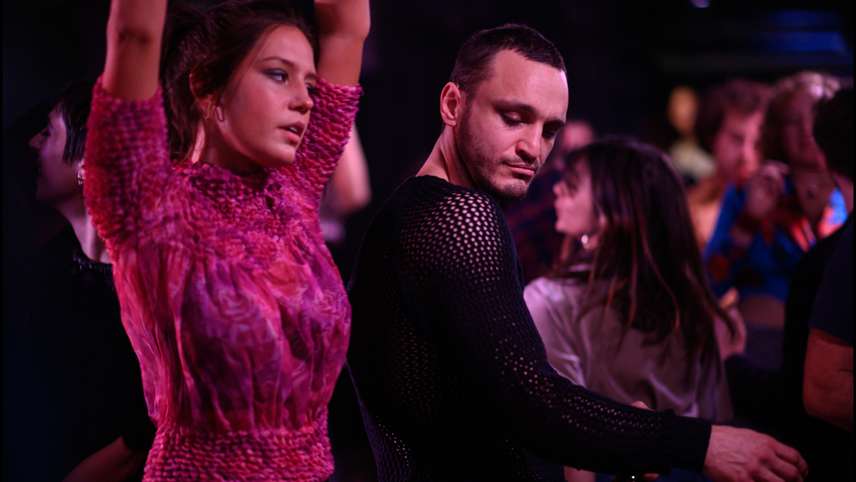When we’re introduced to Tomas (Franz Rogowski) in the opening scene of Ira Sachs’ Passages (2023), the central protagonist around whom most of this three-hander film revolves, he’s micro-managing his actors on a film set. He’s meticulous about details to the point of annoyance – unhappy with his actors who cannot walk down a staircase precisely the way he wants them to. After all, how hard can it be to follow simple instructions? As the film rolls on, we ultimately discover the answer to this question: impossible, especially if Tomas has a say in the final outcome.
Director Ira Sachs has constructed his latest film as a love triangle, but the story, which he’s co-written with Mauricio Zacharias, works a lot more effectively when viewed as a character study of a self-obsessed narcissist. Tomas’ introduction in the opening scene of Passages (2023) sets the rhythm of the film – he’s the catalyst for much of the forward momentum in terms of structure for the film’s narrative – Tomas acts and his actions forces everyone around him to react, and this action-reaction tension is what propels the film onward.
The opening scene is also illustrative in foreshadowing the central conflict around which this film hinges. Tomas loves having control of every situation he’s in, in fact, he downright demands it. This pathological need to have the upper hand manifests in him behaving like a nit-picking perfectionist on a film set, and when removed from a professional setting, the need to have everything his way and as per his liking also causes significant violence and damage to his personal life. The irredeemable nature of Tomas’ narcissistic behavior – where he is willing to go to any and every length to make everyone around him dance to his tunes and manipulate people without an ounce of regret – makes him a repugnant but, nonetheless, the charming protagonist.
Tomas is working on wrapping up his film in Paris – also called ‘Passages’ (the title drop was an exasperating moment), and his marriage with Martin (Ben Whishaw) is seemingly on the rocks. At the wrap-up party of Tomas’ film, Martin goes home early, but Tomas – keen to bask in the glory of his own creation – stays back to continue the festive mood. It’s here that he lays eyes on Agathe (Adèle Exarchopoulos), a teacher who is newly single. Sparks fly on the dance floor between Tomas and Agathe, and they both are clearly attracted to each other. “I had sex with a woman. Can I tell you about it?” says Tomas to a barely-awake Martin the next morning, making the entire episode about himself and his feelings once more.
Censorship of the film – a queerphobic response?
Sachs doesn’t give any indication as to whether Tomas and Martin shared an open marriage or not. And the film doesn’t isn’t really about the moral conundrum of whether Tomas cheated on Martin – soon after, we see Tomas professing his love for Agathe – relationships and sexual identities both remain fluid in Passages (2023). Ascribing any kind of puritanical notions of sex and straight-jacketing sexual desire would go against the film’s aesthetic and philosophy. The film was recently given an NC-17 rating in the United States by the Motion Picture Association prior to its release, but MUBI is set to release the film this week in American theatres unrated and uncut.

The cuts demanded by the MPA have once again brought the issues of censorship, particularly when it comes to stories showcasing male same-sex desire on screen. There is also an argument to be made that the MPA’s rating reeks of homophobia. Sachs hasn’t been one to mince his words, “We’re talking about a select group of people who have a certain bent, which seems anti-gay, anti-progress, anti-sex—a lot of things which I’m not,” he said.
The incessant focus and ongoing discourse around the censorship of the film is despairing because it cheapens the film and sets the wrong expectation, making one believe that the film might be reminiscent of something along the lines of Blue is the Warmest Colour (2013), with gay sex scenes that are explicit, gratuitous and voyeuristic. It also does a disservice to the film by centering discourse around the film’s sex scenes, as if that’s what the film is about or should be seen for.
The death of the sex scene in the film
Of course, we cannot talk about the controversy surrounding the sex scenes in Passages without acknowledging the role of the broader cultural and cinematic landscape, particularly in the United States, that is pushing for minimization of sex scenes and expressions of sexual desire on the big screen.
This debate around the appropriateness of eroticism being depicted on screen caught on in pop culture when Penn Badgley, the lead in Netflix’s show ‘You’, said that he no longer wished to act in sex scenes as a gesture of fidelity towards his wife. Badgley even petitioned the series’ showrunner Sera Gamble to reduce the number of intimate scenes in the show’s fourth season.
If you think this is a one-off incident and not indicative of a worrying trend, here’s another example. In the recent Netflix romcom You People (2023), the two leads, Jonah Hill and Lauren London, allegedly share a CGI kiss at the end of the film, instead of actually kissing. On an episode of The Brilliant Idiots podcast, comedian Andrew Schulz claimed that the entire kissing scene was a CGI construction.
In an interview with Variety, Paul Verhoeven, director of erotic films such as Basic Instinct (1992), and his latest Benedetta (2021) – the story of a lesbian nun affair in 17th century Italy – lamented the decline of studios not backing erotic dramas anymore.
“There’s been a general shift towards Puritanism,” he said. “I think there’s a misunderstanding about sexuality in the United States. Sexuality is the most essential element of nature. I’m always amazed people are shocked by sex in movies.”
In a recent critics roundtable in The New Yorker, a few major critics debated whether the sex scene in modern cinema had declined. Doreen St. Félix made the salient point that complaints about the decline of sex and eroticism in cinema were linked to another, more worrying problem – the demise of the mid-budget adult drama. The rise of superhero films and Marvel-adjacent cinema has created an environment where the necessity of sex scenes on celluloid are not even warranted.
Ms Félix makes a salient point. The recently released comedy No Hard Feelings (2023), starring Jennifer Lawrence, featured a full-frontal nudity scene that catches you off guard. The way nudity is used as a comedic device in the film is reminiscent of early 2000s Apatow-style adult comedies that have all but disappeared from cinematic and cultural consciousness in mainstream Hollywood.
The ‘sex scenes are unnecessary in film’ discourse morphed into absurdity when Film Twitter got involved, with disparaging ‘anti-sex’ hot takes that bordered on the ludicrous. Some tweets even advocated for a return to the Hays Code, which was used to keep films sanitised and free from nudity, graphic violence and more between 1934 to 1968. But those advocating for a return to this kind of censorship forget that the Hays Code was also racist and homophobic, with the guidelines being actively used to police stories and narratives involving LGBTQ characters and interracial relationships on screen.
And thus, we come back full circle to where we started from. Any form of sanitisation or censorship of eroticism on celluloid would disproportionately impact queer narratives and films that explore queer sexual desire such as Passages – because the depiction of queer desire is still something that feels subversive. In an interview, Ira Sachs explained that sexyness was always important for him to showcase in Passages.
“Sexiness was very important to me, so I wanted his [Tomas’] clothes to show a lot of skin,” he said. “I went through a lot of Éric Rohmer films – particularly those shot by Nestor Almendros – and I was always aware how horny those two men seemed in their making. I wanted to make a horny film.”
A ‘horny’ film that’s not all about sex
While the film is undeniably sexy, the heart of the film remains the constant back-and-forth between Tomas-Agathe and Tomas-Martin. Tomas continuously manipulates both Martin and Agathe as per his whims and desires as he’s unable to decide once-and-for-all which one out of the two he really wants to be with. After a point, this shuttling gets repetitive and tiring, and Rogowski’s Tomas starts to resemble a toxic ex that keeps re-inserting himself back in your life again and again even though he’s not welcome anymore. As Amad (Erwan Kepoa Falé), one of Martin’s lovers tells him, “You can’t see it yet, but you won’t survive this. Either of you.”
Part of the problem with the film is the obviousness of the casting. Whishaw and Exarchopoulos both neatly fit into the archetypes of what you have come to expect from both these actors to essay on screen. Exarchopoulos channels her ‘naïve French girl with sex appeal’ energy, while Whishaw is reduced to playing the exasperated and jilted lover who can’t stop himself from getting drawn back into Tomas’ arms. Both characters mainly exist as Tomas’ playthings, when both Whishaw and Exarchopoulos deserve better than what they get – as characters in the film and as actors working with wafer-thin, two-dimensional character arcs.
This is because the film – much like Tomas himself – is singularly obsessed with him. Rogowski has fun with a morally reprehensible character, turning up the charm offensive to counterbalance the awfulness of his character’s actions. However, this intense focus on Tomas comes at the expense of fleshing out Martin and Agathe better, and for a film that’s largely a three-hander, it needed a more even-handed approach in terms of the respective character arcs.
Passages (2023) screened at the Sydney Fim Festival, is currently screening at the Melbourne International Film Festival, and is in cinemas in the United States in limited theatrical release.
Read More: Passages (2023) Movie Review – Franz Rogowski is a bisexual narcissist in Ira Sachs’ brutal and affecting look at modern relationships and their messy overlay
Passages (2023) Links: IMDb, Sydney Film Festival, Rotten Tomatoes, Wikipedia
Director: Ira Sachs
Writers: Ira Sachs, Mauricio Zacharias
Cast: Franz Rogowski, Ben Whishaw, Adèle Exarchopoulos
Cinematography: Josée Deshaies
Editor: Sophie Reine
Language: English, French
Genre: Romance, Drama
Runtime: 91 minutes







